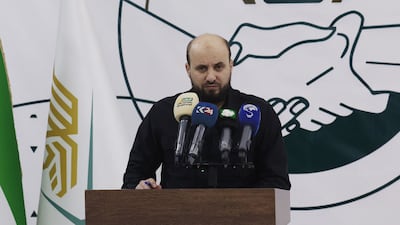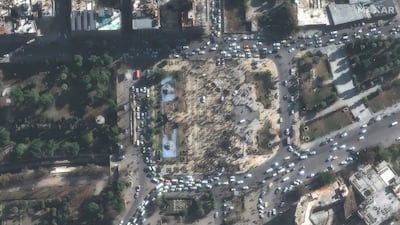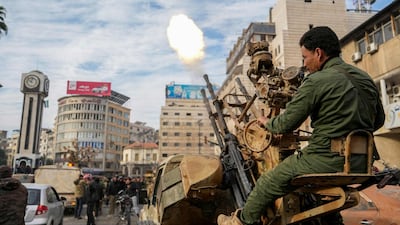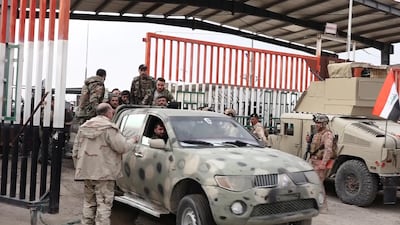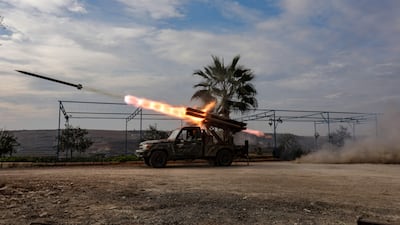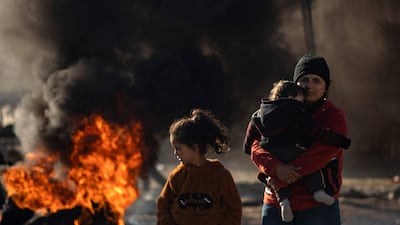In the space of a week, anti-government Syrian rebels have swept through north and western Syria, facing little resistance from forces loyal to President Bashar Al Assad.
In a multipronged operation, a coalition of rebels led by Hayat Tahrir Al Sham, a former Al Qaeda affiliate, have taken the key city of Aleppo, Syria’s industrial heart. They are now approaching the north of Hama, another strategic and significant urban centre on the motorway between the capital Damascus and Aleppo. Rebels directly backed by Turkey, known as the Syrian National Army, have pushed east and retaken areas previously held by Kurdish militias.
They launched the operations, Syrian opposition officials told The National, after the past year saw political negotiations between Syria, Turkey, and Damascus allies Russia and Iran reached a dead end, and Assad forces resumed bombing campaigns on rebel-held areas.
The offensive is the biggest challenge to Mr Al Assad since the 2011 uprisings against his rule, which were met with brutal crackdowns and eventually spiralled into civil war. His forces, in the past propped up and sustained by a panoply of Iran-backed militant groups from Lebanon, Iraq, Afghanistan and Pakistan, melted away over the past week, unable or unwilling to put up a fight.

Key questions remain about what happens next. In less than a week, rebels have doubled territory under their control, according to Charles Lister, head of the Syria programme at the Washington DC-based Middle East Institute. One key factor to follow will be their ability to govern and provide services in the areas they have taken.
Opposition forces have previously shown their ability to set up governance structures in areas under their control, by working with international humanitarian agencies and carrying out trade across the border with Turkey.
Their capacity also depends on the multitude of rebel groups maintaining some sort of cohesion and not turning against each other. Tension has risen between the so-called Syrian National Army, a coalition of Turkish-backed groups, and Hayat Tahrir, also known as HTS, over control of certain key areas they have taken from Assad forces, and to date it remains unclear how they will divvy up territory between them.
Aymen Al Asmi, spokesman for the Syrian opposition delegation at political talks over Syria in the Kazakh capital Astana, said that low-level tension was to be expected, and the opposition’s overall ability to govern should not be measured on some infighting between military factions. Their ability to minimise internal fractures depends on support from the international community, he said.
“The military guys are always more stubborn. The only guarantee is support to the political entities by the international community – the EU, the UK, the USA – to support the opposition so they can control these areas – materially and politically,” he told The National. “The only solution now is to strengthen the political bodies, so that the military bodies are subject to them, and not the opposite.”
But limited resources and the fact that Hayat Tahrir is designated as a US-designated terrorist organisation may hamper their ability to rule.
“I think they are going to need massive external support, and I think that will be contingent on making the administration in these areas – not HTS and not HTS-controlled, in order to avoid the terrorist designation being an obstacle towards external support coming into these areas,” Dareen Khalifa, a senior adviser at the International Crisis Group think tank, told The National.
Rebels, many of whom are Sunni Islamists, have so far tried to send assurances to Syria’s different communities and sects that their ways of life will be protected.
Aleppo’s 25,000 Christians have started to decorate their neighbourhoods with Christmas trees for upcoming festivities, and following initial fear, religious minorities quickly re-emerged into public life, the city's lead bishop told reporters yesterday.
But the proof will be in the pudding, Ms Khalifa added.
“I think they [the rebels] fully understand the importance of following through on these promises, whether or not they will is yet to be seen. It's going to be tested in the next weeks and months, if they manage to hold ground.”
Rebels are now attempting to take the city of Hama, and have taken villages to the north of the city, without reaching the urban centre.
They have been unable to advance on the city as quickly as they did in Aleppo, where under-resourced and demotivated Syrian army fighters, lacking significant Iran-backed support, melted away.
“The timing of the advance into the city of Hama or elsewhere is subject to the plans of the military operations management, as there are priorities imposed by the reality of the battle,” Col Hassan Abdul Ghani, a rebel commander, told The National.
But more counter-attacks by pro-government forces may complicate that. Mr Al Assad appointed Gen Suhail Hassan, a former commander of the elite Tiger Forces, as the overall commander of the northern Hama front in an attempt to fend off the rebel offensive.
Abu Mohammed Al Jawlani, leader of Hayat Tahrir, has also said that the offensive will continue until rebels reach “the heart of Damascus”. Their ability to take the capital is unproven and unclear: over more than a decade of conflict, Assad has held the city, despite heavy fighting and displacement in its outskirts.
While Russia is likely loath to engage as fully as it has in the past in Syria, it has begun air strikes on rebel-held areas in recent days, in some cases killing civilians at medical centres. Should those attacks escalate, as civilians in Aleppo and Idlib fear, the rebels may find it harder to progress further, including to the capital Damascus, hold territory it has already taken, or contain a humanitarian disaster. More than 50,000 people have been displaced by the multifront fighting, according to the UN.
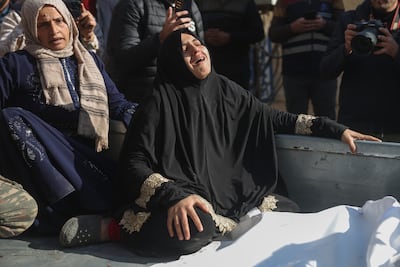
Any further advance on Kurdish-held areas in the north-east by Turkey-backed rebels will likely hinge on moves by US president-elect Donald Trump when he takes office in January.
If Mr Trump pulls US support for Kurdish groups across northern Syria, as he has previously threatened to do, their ability to operate and fend off rebel advances will be severely hindered. The Turkish-backed opposition welcomes Kurds as part of Syria, according to Ahmed Touma, head of the Syrian opposition's delegation to the Astana talks. But it clashes with them over what they see as separatist aims directed by the PKK leadership in the mountains of northern Iraq.
“As for the other areas under the control of the SDF, currently, we are waiting for President Trump to take power,” Mr Touma told The National, referring to the US-backed, Kurdish-led Syrian Democratic Forces, who control most of north-eastern Syria. “I think negotiations will be suggested, they may be difficult negotiations, and if they do not come to fruition, then there is a path ahead of us to solve the issues.”
A small chance to resume a diplomatic path out of the current escalation may come in the form of renewed talks between Russia, Turkey and Iran later this week in the Qatari capital Doha, according to a Syrian and a Turkish official briefed on the developments.
Rebels have extended their territorial reach so far that it is unclear if Mr Assad and his allies would be willing to accept a new series of de-escalation measures along the current lines.
“What's important is that they agree to a ceasefire and freeze the lines that they are holding now,” Omer Onhon, Turkey’s last ambassador to Syria before the two countries cut ties in 2012, told The National. “I’m assuming that this could be a best scenario.”
The UN and western powers including the UK have called for a de-escalation to contain the violence and prevent more bloodshed in Syria, where hundreds of thousands of people have been killed, tens of thousands more have gone missing, and over half the population are displaced in the civil war.
But it remains unclear if any political track will be enough to contain the current escalation.




